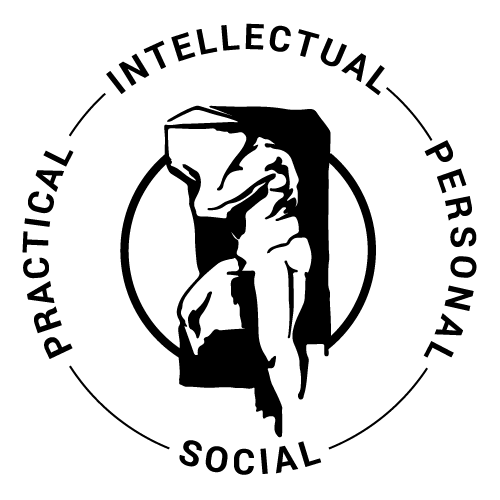“It is a sign of crudity and indigestion to throw up what we have eaten in the same condition it was swallowed down; and the stomach has not performed its office, if it has not altered the figure and shape of what was committed to it for concoction…Let the tutor make his pupil thoroughly sift everything he reads, and lodge nothing in his fancy upon mere authority…To the fragments borrowed from others he will transform and bend together to make a work that shall be absolutely his own; that is to say, his judgment. His education, labor, and study aim only at forming that.” — Michael Montaigne
If I were to tell you that you could have a discussion centered around your interests and your questions at school and that you could civilly, productively, happily learn from the differing views of others in the discussion, would you believe me? Astonishingly, you can! That is, if you use the principles of Socratic Practice.
Socratic Practice is a formidable discussion methodology that, when used properly, incorporates Active Listening at its best and powerfully nurtures reasoning skills and independence. Classrooms using Socratic Practice are active learning environments–intellectually, socially, and physically engaging. I am referring to a very specific, carefully crafted methodology of teaching, which I will describe shortly. You may have been to classes called Socratic Seminars which are quite different from what I mean.
Socratic practice discussions harness the motivating power of individual interest because students are encouraged to ask their own questions of what they are studying, not the teacher’s questions. The learners become so engaged, Socratic Practice discussions don’t tax their ability to pay attention, making learning much easier and very enjoyable. Students often get into a Flow state, forgetting how much time is passing because they are so engaged.
In other discussions called “Socratic Seminars,” a teacher might ask a question like “What is justice?” and then proceed to tell you you’re wrong when you give an answer the teacher doesn’t want. Well, that’s wrong. Socratic questioning is meant to develop your ability to think about a subject, not to test you or call you on the carpet for a wrong answer.
Teachers looking for the right answer encourage you to focus on pleasing the teacher, not pleasing yourself. Because of this practice, students often view school as the place to give the teacher the answer he wants to hear.
The truly excellent teacher aims at helping you learn how to find the right answer yourself.
That’s why many students’ first encounters with classes using Socratic Practice are often shocking–mostly pleasurably so, but with some discomfort at the challenge of analyzing a text through their own reasoning. After a lifetime of being told what to learn, what the “right” answer is—or that any answer is right, because there is no standard of truth–teachers of Socratic Practice often have to coax students to voice their thoughts.
Consequently, in the beginning of a program using Socratic Practice, the teacher (often called “tutor,” i.e. guide to learning) must work especially hard to shape the learning environment. Just as in any Montessori school, the prepared environment is a key to success in developing the thriving, independent-minded learner.
One of the beauties of a Socratic Practice discussion is the remarkable amounts you learn from the other people in the discussion. That’s because each person’s experiences and ways of putting information together are unique. I’ve read Blake’s “The Tiger” twenty times, but, the twenty-first time, my student Brendan helped me see it in a new way.
So: How Do We Talk About Politics Without Talking About Politics?
Talking about politics without talking about politics, i.e. getting into acrimonious arguments, is only possible when people actually listen and try to understand the terms and meaning of their interlocutors. Here are the conditions that foster good discussion in which you are actually listening and civilly talking to the other people, regardless of topic–and developing excellent reasoning and social skills, as well as a strong sense of autonomy:
The goal of the discussion is to reason together about the material, in order for each person to arrive at his or her own, independent judgment. Participants think together to think independently.
In the discussion, reason is the only authority. This means every person, teacher (“Tutor”) and student alike. Each must use logic and facts to support his or her opinions.
In order for the discussion to be excellent, all participants should be able to judge the facts discussed for themselves, firsthand. If a participant brings up a lot of facts and claims which he alone knows, how can anyone else examine those claims firsthand? Instead, the tutor encourages observations of the facts in the work used by everyone in the discussion, generalizations closely derived from the facts, and conclusions reasoned from the facts. Any outside material must be explained in general terms, understandable to general reasoning.
When Socratic Practice is implemented well, the group engages in excellent objective reasoning, learning from each other because everyone brings their understanding and thoughtful interpretations to the discussion. The tutor doesn’t aim at a “right interpretation,” yet it is common to see well-functioning groups reasoning together arrive at solid conclusions, conclusions an expert would reach, about the meaning of very difficult texts, whether Plato’s Meno, Einstein’s Relativity, or Mises’ Human Action.
Using these methods, you can productively talk about politics with friends, relatives, neighbors, and strangers!
What Have Others Gained from Socratic Practice?
The evidence is strong that the methods of Socratic Practice, consistently applied, increases cognitive skills. Our advisor, Michael Strong, extensively discusses these methods in The Habit of Thought: From Socratic Seminars to Socratic Practice.
Professor John Tomasi implemented this method in his hugely successful special program, The Political Theory Project at Brown University. He says: “Kids are sick and tired of being told what to think. They want to make up their own minds. They want to be challenged.” The kind of work done through Socratic Practice discussions of the Great Books does exactly that.
Scott Buchanan, architect of the Great Books program at St. John’s College in Annapolis, voiced the ultimate goal: “Have you allowed adverse evidence to pile up and force you to conclude that you are not mathematical, not linguistic, not poetic, not scientific, not philosophical? If you have allowed this to happen, you have arbitrarily imposed limits on your intellectual freedom, and you have smothered the fires from which all other freedoms arise.”
If you’re looking to hone your skills in active listening and reason, while boosting your academic and professional future, then check out our Boost Your Future program!



